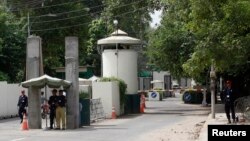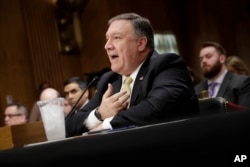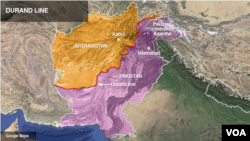Pakistan rejected Friday U.S. assertions American diplomats in the country are being mistreated as relations between the two uneasy allies in the "war on terrorism" continue to deteriorate.
Secretary of State Mike Pompeo raised the issue Wednesday about the treatment of U.S. diplomats serving in Pakistan during a Senate panel hearing.
"My officers, our state department officers are being treated badly as well, folks working in the embassies and councils [and] in other places are not being treated well by the Pakistani government either," Pompeo said.
When asked about Pompeo's assertions at his weekly news conference Friday, however, Pakistani Foreign Ministry spokesman Mohammad Faisal disagreed.
"The Foreign Ministry has not received any specific complaints from the U.S. side after the establishment of the mechanism to resolve the issue on treatment of U.S. diplomats in Pakistan," he said.
Faisal noted that "every possible support as per international laws and norms as well as reciprocity" is being given to diplomats from all countries in Pakistan.
Earlier this month, Washington ordered Pakistani diplomats in the U.S. not to travel beyond 40 kilometers from their posts without prior permission. Islamabad retaliated and imposed similar restrictions on American diplomats in the country.
In January, President Trump suspended nearly $2 billion in military assistance to Pakistan until the country moves decisively against terrorist sanctuaries on its territory being used to launch deadly attacks on American forces in neighboring Afghanistan.
The allegations have long dogged Islamabad's relations with Washington. Traditionally mistrusted mutual ties have been particularly on the downslide since August when President Donald Trump announced a new South Asia Strategy, blaming Pakistan for fueling the Afghan conflict by supporting Taliban insurgents.
Islamabad rejected the Trump strategy as an attempt to scapegoat Pakistan for U.S. security failures in Afghanistan.
In rare comments Thursday, U.S. Special Inspector General for Afghanistan Reconstruction John Sopko also questioned Washington's narrative of singling out Pakistan as the key problem.
"We keep referring to Pakistan as being the key problem. But the problem also was that the Afghan government at times was viewed very negatively by their local people," Sopko noted.
He was delivering a public talk at the Brookings Institution in Washington on U.S.-funded stabilization programs in Afghanistan. Sopko has until now avoided comments on external dimensions of the Afghan war.
SIGAR has been submitting quarterly reports to Congress with a mandate to prevent fraud and recommend better spending of U.S. taxpayers' money in Afghanistan. In its quarterly reports, the oversight authority has regularly cited Afghan political tensions, governance issues and corruption as main drivers fueling the Taliban insurgency.
"When we poured so much money into these unstable environments we contributed that problem of creating more warlords, more powerful people who basically took the law into their own hands. So, in essence the government we introduced, particularly some of the Afghan Local Police forces, which were nothing other than warlord militias with some uniforms on, were just as bad as the terrorists that were there before," said Sopko.
Former commander of U.S. and foreign forces in Afghanistan, retired Gen. John Allen, who hosted Sopko's talk, also underlined the need for tackling simultaneously the triangular threat of the Taliban, narcotics and criminal patronage networks operating in the country.
"If we are not properly mixed that way we will fool ourselves to believing we have defeated the Taliban in a particular area only to find out that now we got the criminal patronage networks to work in. They are deeply embedded in the society and they are well fueled with their drug enterprise."







